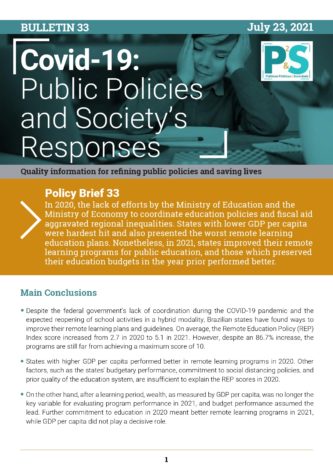Main conclusions
- Despite the federal government’s lack of coordination during the COVID-19 pandemic and the expected reopening of school activities in a hybrid modality, Brazilian states have found ways to improve their remote learning plans and guidelines. On average, the Remote Education Policy (REP) Index score increased from 2.7 in 2020 to 5.1 in 2021. However, despite an 86.7% increase, the programs are still far from achieving a maximum score of 10.
- States with higher GDP per capita performed better in remote learning programs in 2020. Other factors, such as the states’ budgetary performance, commitment to social distancing policies, and prior quality of the education system, are insufficient to explain the REP scores in 2020.
- On the other hand, after a learning period, wealth, as measured by GDP per capita, was no longer the key variable for evaluating program performance in 2021, and budget performance assumed the lead. Further commitment to education in 2020 meant better remote learning programs in 2021, while GDP per capita did not play a decisive role.
- Since the onset of the pandemic, the lack of an education plan coordinated by the Ministry of Education (MEC) and the Ministry of Health (MH) led to an initial aggravation of regional inequalities. Hence, poorer states performed worse on remote learning plans in 2020.
- The lack of equity criteria in the distribution of federal fiscal aid to the states further contributed to the inadequate performance of education plans and actions, which failed to circumvent regional inequalities among states. Notwithstanding this adverse scenario, we find a learning effect in the states, which have devised better plans in 2021 (especially in states that preserved their education budgets).
Responsible Work Group
- Lorena G. Barberia (USP)
- Ursula Dias Peres (USP)
- Fábio Pereira dos Santos (São Paulo City Council Technician)
- Ingrid C. L. Silva (USP)
- Luiz Guilherme Roth Cantarelli (USP)
- Pedro H. S. Schmalz (USP)
- Dara A. Vilela Pinto (USP)
- Maíra Meyer (USP)


